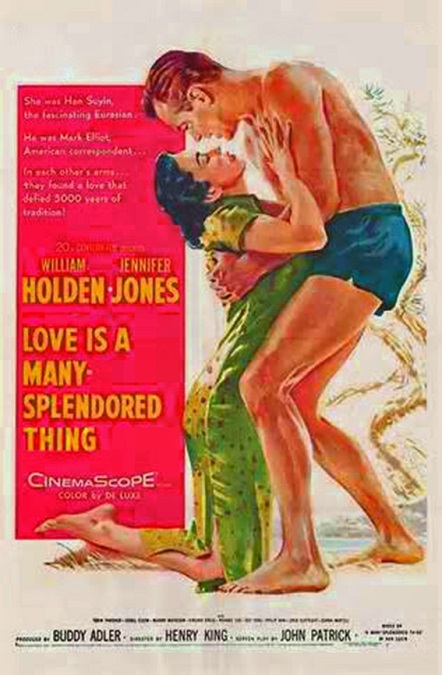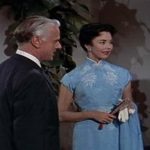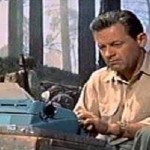
Love is a Many-Splendored Thing – 1955
This was a romance done right. It was about two people who fell in love at the wrong time. They were both complex, flawed characters, making them believable, and they tried to make their romance work, despite the insurmountable odds. The ending was unfortunately tragic, but also all too believable. But that didn’t make it a bad ending, just a sad one.
The story takes place in Hong Kong in 1949 and 1950. William Holden plays Mark Elliot, a married but separated correspondent, assigned to cover the Chinese Civil War. While there, he meets Doctor Han Suyin, played by Jennifer Jones, a Eurasion woman who is a widow. Mark falls in love with the beautiful Han and pursues her aggressively. At first, she refuses his advances, saying that she has closed her heart and does not desire love. But his constant calls and overtures of desire, show her that she still has the capacity to love, after all.
There were no other big names in the film, but the rest of the cast did a fine job. You see, the big conflict of the film dealt very specifically with the supporting cast. Prejudice is apparently not just a white man’s affliction. The Chinese people were shown as incredibly prejudice against Han and her foreign lover. Her family practically shunned her and her employers at the hospital actually fired her, all because of her love affair with the American.
The romance was well thought out and did a good job of not being sappy or sloppy. The characters knew they were asking for trouble but braced themselves to face it with courage and sense. It was a plot that was well thought out and it was no wonder. The script was based on the autobiographical book A Many-Splendored Thing, by the real Han Suyin.
I have gotten used to seeing William Holden in this kind of role, but he was good at it, so why not? He was handsome but not gorgeous, giving him an air of the common man. His character was sometimes like a bull in a china shop, and sometimes he was annoyed with his Eurasion lover’s propensity toward superstition, which only makes sense. As far as I can tell, in Chinese culture, superstition is quite common. Mark was slightly insensitive, but passionate and sincere. His love was honest and true, and because of the quality of Holden’s acting, I liked him.
Jones also did a fantastic job. At first I had a hard time believing that she was Chinese, but her western eyes were easily explained by a few lines of dialogue which told of Han’s parentage. Her mother was Chinese, but her father was English. Jones, as you might remember, did a wonderful job as Bernadette in the 1943 Best Picture nominee, The Song of Bernadette. Here, she played a completely different character, but once again she proved that she was a more than up to the challenge.
The film was shot in color, and had some pretty wonderful cinematography. The sets and costumes were just fine, but I have to make mention of the score. Sure there was the chart-topping song that shared its title with the film, but it was the incidental music that really caught my attention. It was hard to watch the drama taking place without a sense of impending doom. Any time there was even a hint of trouble, the romantic theme shifted into a minor key. There was very little subtlety in the background music. I knew that the romance was never going to work because the score refused to give me any reason to believe that it would.
Unfortunately, when the tragedy happened in the film’s climax, I was unsurprised. All the little warnings were too easy to see. That’s not to say I didn’t feel bad for the characters. I did. But that was due to Holden and Jones and their wonderful acting. But at least the tragedy was not exactly what I was expecting. I was actually expecting them to be torn apart by the prejudices that surrounded them on every side, though that isn’t what happened. Mark was assigned to cover the Korean War, and was sent to the battle zone where he was eventually killed. But I wonder if their love would have lasted if he had been able to remain with her. Would she be happy with him if she was forced to give up the career she loved? Would he be able to marry her when his ex-wife refused to grant him a divorce? I would like to think so, but I guess we’ll never know.








